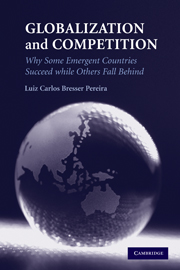1 - Globalization and Catching Up
Published online by Cambridge University Press: 04 May 2010
Summary
Despite conventional wisdom, globalization and nation-states are phenomena that do not contradict each other but are rather part of a same universe, which is the universe of contemporary capitalism. Globalization is a debatable term because the process that characterizes recent capitalist development has increased, rather than diminished, the international significance of nation-states, as stiffer competition between them for faster economic growth rates has made them even more strategic to their respective nations. In the early 1990s, soon after the collapse of Communism, globalization was presented as an indication of U.S. hegemony and of the affirmation of a single path to economic development – the neoliberal path of the Washington Consensus, or of conventional orthodoxy. On the opposite side, economists and politicians who identify with the new hegemony have claimed that globalization would benefit everyone. Martin Wolf (2004: 4) summarized this view: “the failure of our world is not that there is too much globalization but that there is too little.” In a similar vein, the World Bank (2002) published a report in which it stressed globalization's success in promoting catching up and poverty reduction. To justify this conclusion, it divides nation-states into three groups – rich ones, more globalized developing ones, and less globalized developing ones – and shows that, in the 1990s, whereas the per capita growth rate of rich countries increased by nearly two percentage points per annum, and the growth rate of more globalized developing countries (corresponding to nearly three billion inhabitants) grew at rates of around 5 percent, in less globalized countries, the rates were negative, at around 1 percent.
- Type
- Chapter
- Information
- Globalization and CompetitionWhy Some Emergent Countries Succeed while Others Fall Behind, pp. 19 - 53Publisher: Cambridge University PressPrint publication year: 2009



